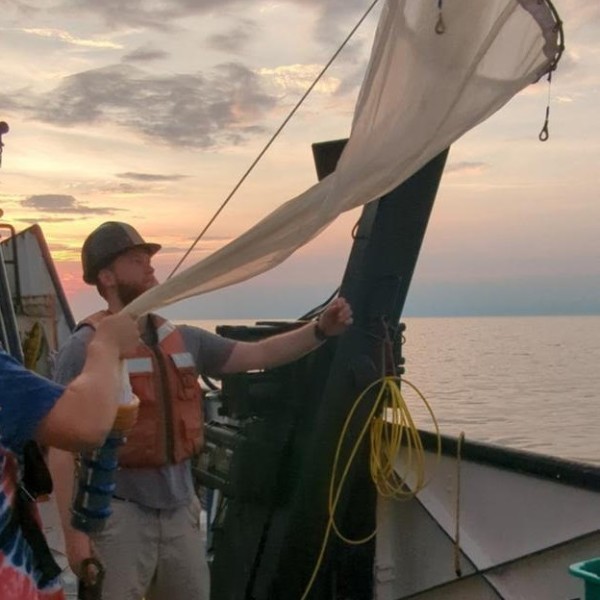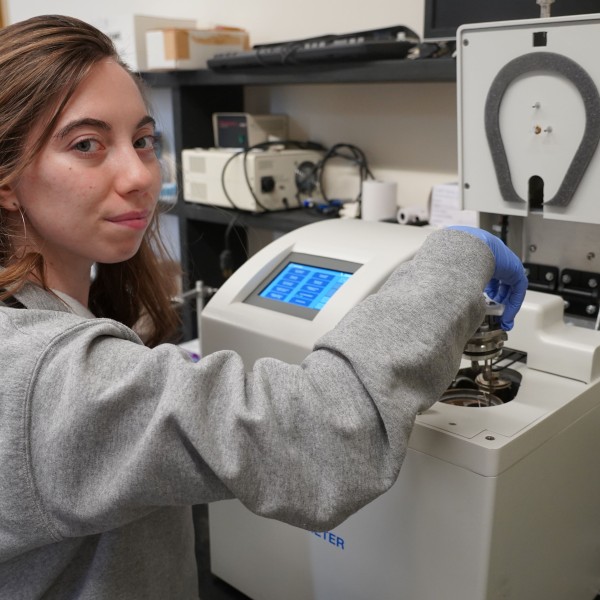Jenny Goldstein explores Indonesia’s environmental crises
As a political ecologist, Jenny Goldstein studies the intersection of power dynamics, the environment, and the meaning of place and space. Her research has taken her across Southeast Asia, Africa and the United States to study the role that environmental conservation and development play in terms of governance, data, human health and ecological change. As assistant professor in Global Development and core faculty member of the Southeast Asian Studies Program, Goldstein encourages her students to think about the big picture and to find their place in climate change and grand challenges in social and ecological systems.
Goldstein is at the forefront of scholarship analyzing how scientific knowledge gets embedded in power relations. “Unfortunately, scientific knowledge is not a neutral force and is not free from politics,” Goldstein says.
Originally trained as a geographer with a PhD in Geography from the University of California, Los Angeles, Goldstein looks at the why of the where.
“Where things are located matters,” Goldstein says. “How do you connect things that are happening locally to regional or national and global scales and vice versa?”
With a curiosity to understand how environmental crises relate to social behaviors, Goldstein unpacks how power dynamics impact the role that humans have in the environment and development. She also considers herself a political ecologist, working to understand environmental issues alongside political, economic and social structures of power, such as colonialism or economic inequality.
Environmental rehabilitation and digital geography in Indonesia
In the 1990s, the Indonesian government instituted policies to transform the country’s vast peat swamp region into productive agricultural land. The hope was to replace dense swamps with thriving rice paddies and inject the country with a rich new food source for its rapidly growing population.
What happened instead was a quagmire of misguided policy, bureaucratic intransigence and environmental degradation. Known as the Mega Rice Project, the rice paddies quickly turned into one of the country’s worst environmental disasters as fires spread in the peatlands and emitted alarming amounts of carbon dioxide into the atmosphere.
In the Indonesian peatlands Goldstein explores the interactions between institutions, individuals and environmental changes by collaborating with a wide variety of actors from village heads and small holder farmers to scientists and government officials. Goldstein’s article on the role of human activities, hydrology and fuels in landscape-scale fires was awarded the 2020 Best Paper Award from the Singapore Journal of Tropical Geography. She was recently awarded a 2021-2022 Cornell Center for Social Sciences faculty fellowship to pursue an ambitious book project diving into Indonesia's peatland rehabilitation.
Over the years Goldstein’s research has grown to study multiple political ecology crises in Indonesia and beyond. For example, with support from the Cornell Atkinson Center for Sustainability, she is currently studying why and how small-scale gold miners use mercury. While the original research question was to find ways to halt the use of mercury given its negative impact on the environment and human health, Goldstein’s research focus quickly expanded. One of her favorite parts of social science research is how an academic can enter into fieldwork with one research question and all of a sudden see a bigger picture: “It’s like lifting up a rock and seeing a bug ecosystem full of layers of issues to be analyzed,” Goldstein says.
Photos from the field





Colleagues look at old photos with hosts at an overnight peat forest ‘camp’ in Central Kalimantan.
A small-scale gold mining camp uses water to separate gold particles from wet soil in Central Kalimantan.
Colleagues buy pineapples on the side of the road in Central Kalimantan.
A local guide transports researchers in a peat swamp forest by canoe, which is a common form of transportation in Katingan, Central Kalimantan.
Goldstein tours the landscape from above in West Sumbawa looking for small-scale gold mining camps.
Looking forward, Goldstein will continue to explore the role that digital geography, which refers to the use of satellite imagery and remote sensing to learn more about a place, has in decisions around the environment. With increasing rates of digital geography practices, there is a need to analyze the politics of data — particularly who has access to data and what they use it for. Whether it's used for learning about deforestation in your own community or for the government to plan for conservation efforts, power relations come into play. “Data is not neutral, and it is not always good,” Goldstein explains. Her forthcoming co-edited volume “The Nature of Data: Infrastructures, Environments, Politics” will explore the ways that global environmental politics and the digital realm are increasingly intertwined, asking how data infrastructures shape uneven control and access to land, natural resources, and the environment.
Inspiring future environmental leaders
For Goldstein, the impact of her work shines through her students. Teaching courses such as the Political Ecologies of Health and Climate Change & Global Development, Goldstein works with her students to understand the relationship between social structures and the environment.
She encourages her students to think about the big picture — “We’re already in the mess. How do we cope and live with it? How do we envision something better?”
In the fall 2020 semester, her students brought their perspective on climate change and global development to the public eye with a new podcast series exploring issues such as Cornell’s contentious divestment process from fossil fuels, Indigenous food systems’ adaptation to climate change, and rural community opposition to renewable energy.
As students navigate the start of their careers, Goldstein wants them to walk away from Cornell with intellectual tools that encourage them to think about the world with a meta-perspective and an understanding of the agency they have within it: “I think it is important that we don’t tell students what to do or provide the solutions, but rather train them how to think.” Her goal is to prepare students to better understand the world and what they want to do with their lives. “I think that supporting our students to think in more complex, nuanced ways is one of the greatest things we can do as professors.”
Faculty spotlight
Jenny Goldstein
Jenny is an Assistant Professor in the Department of Global Development at Cornell University, an Atkinson center for a Sustainable Future Faculty Fellow, Cornell Center for Social Sciences faculty fellow and a core faculty member of Cornell's Southeast Asian Studies Program.

Keep Exploring

News
- Biological Field Station
- Ashley School of Global Development and the Environment
- Natural Resources and the Environment Section

Field Note
- Animal Science
- Animals
- Climate Change

We openly share valuable knowledge.
Sign up for more insights, discoveries and solutions.


